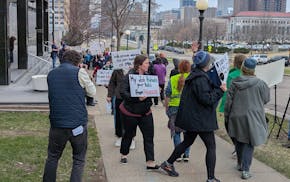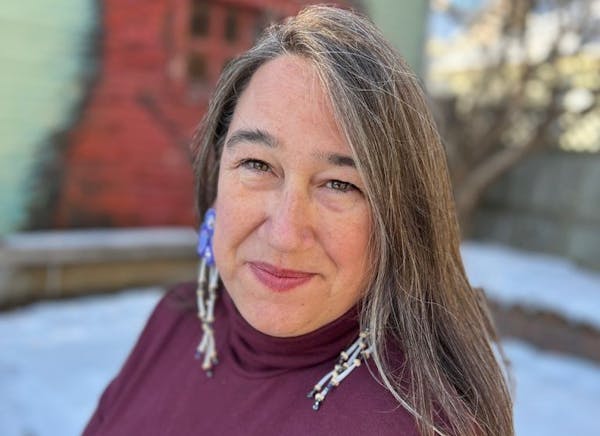Writer, filmmaker and performance artist Junauda Petrus opened her two-year term as Minneapolis' new poet laureate with a love letter to her hometown.
In her poem, "Ritual on How to Love Minneapolis Again," read during her official announcement on Jan. 30, Petrus spoke of shared meals in immigrant neighborhoods, Native drums at school assemblies, henna and silk dresses at Somali weddings, and the "funk of blunt guts" on the Route 5 bus, where Black girls whisper and giggle in bonnets and slippers.
"I was riding the 5 bus a lot. If you're from south Minneapolis or the North Side, there's just something about that 5. Like, this is Minneapolis," Petrus said. "It's like being in love where I just want to tell you all the sweet things. I just want to make you understand it."
Her poem highlights both the disparities and vibrancy of the city. It acknowledges the effects of historic redlining and housing insecurity within communities of color, while celebrating the joy that emerges from cultural resilience — like immigrant families adapting to Minnesota winters or the ties between the Mississippi River and rivers in Africa and Southeast Asia.
Her work traces the migration of people and memory, connecting Minneapolis to the ancestral homelands of Black, Indigenous and immigrant communities. There is grief in the poem, but also joy.
Petrus, 43, applied for the poet laureate position in 2023. Ojibwe writer Heid E. Erdrich was chosen to be the first to hold the title. For Petrus, Erdrich's leadership set a strong foundation for what the role could be.
"It's not just about 'What am I doing with the poetry?' but to cheerlead poets," Petrus said. "That's also part of my job — to bless up poetry and be blessed by poetry."
When she received the call from the Loft Literary Center informing her that she had been selected as the city's second poet laureate, Petrus was at home with her wife and daughter.
"It really showed me the kind of artist, the poet I've been and the community member I've been," she said. "Especially with all that's going on, it felt like a particular positive light for people at this moment."
As poet laureate, Petrus will receive an honorarium of $16,000, paid quarterly over her two-year tenure, along with a $4,000 budget to plan and execute a project aimed at engaging youth or addressing important community issues through poetry. Her key responsibilities include hosting public poetry events and teaching two classes per year through the Loft Literary Center.
Petrus, who grew up in the Phillips neighborhood, is the daughter of Caribbean immigrant parents. Her writing is influenced by reggae, hip-hop music and the storytelling rhythms of Caribbean culture.
"There's a way Caribbean people tell stories," Petrus said. "It's also a Black thing maybe, where it's like 'Girl, you're never going to believe what happened yesterday.' 'What happened?' — It's always this back and forth, and I try to play with some of that energy in my writing."
In 2009, she studied West African and Afro-Caribbean dance and trained in circus arts in Brooklyn, N.Y., performances that further shaped her work in writing, theater and film in Minneapolis.
Her debut novel, "The Stars and the Blackness Between Them," released in 2019, follows a teenager from Trinidad who moves to Minneapolis and falls in love with a local girl.
The novel was on a list of 850 titles flagged by Texas Republican state Rep. Matt Krause for potentially causing "discomfort, guilt, anguish, or any other form of psychological distress" in students, though it has not been officially banned in the state. It has been banned in Florida's Clay County School District and Iowa's Clear Creek-Amana Community School District.
"I just think it's hard to conceive of books being banned in a time when there's hyper accessibility, but it's actually very violent," Petrus said.
Her focus on Black queer youth also appears in her 2022 play, "Impact Theory of Mass Extinction," set in 1980s south Minneapolis. It follows two queer Black teens who travel through a portal to discover the realm of dinosaurs.
Petrus' children's book, "Can We Please Give the Police Department to the Grandmothers," released in 2023, originated as a poem in response to the police killing of Michael Brown in Ferguson, Mo., in 2014. It was further fueled by the murder of George Floyd in 2020.
Her forthcoming novel, "Black Circus," is set in 1990s Minneapolis and follows a Caribbean teenage girl who finds belonging in a circus crew.
As poet laureate, Petrus hopes to foster a citywide appreciation for poetry through writing events, visual art and film.
"I want to do a poetry reading out of my barber shop and just have people come and get their haircut … I want to bring it on the bus like guerilla poetry," Petrus said. "I want to figure out all the ways that I can just bring art to people."
About the partnership
This story comes to you from Sahan Journal, a nonprofit newsroom dedicated to covering Minnesota's immigrants and communities of color. Sign up for a free newsletter to receive Sahan's stories in your inbox.
A Congolese family begins a new life in Minnesota, hoping their eldest daughter will one day join them

Minneapolis Poet Laureate Junauda Petrus brings Black, tender joy to the city

Motorist shot and severely wounded in downtown Minneapolis, drives off and hits family's vehicle

Second man charged in shooting that wounded 3 teens moments after State Fair's final night

